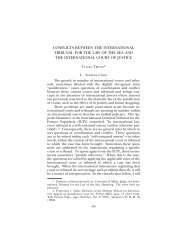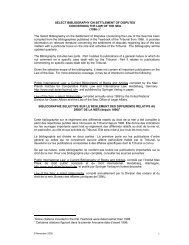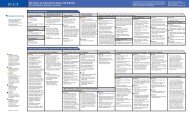John H. Jackson, Fragmentation or Unification Among International ...
John H. Jackson, Fragmentation or Unification Among International ...
John H. Jackson, Fragmentation or Unification Among International ...
Create successful ePaper yourself
Turn your PDF publications into a flip-book with our unique Google optimized e-Paper software.
1999] WORLD TRADE ORGANIZATION 825nexes to the WTO. So we have en<strong>or</strong>mously broadened thecontext and the competence of this <strong>or</strong>ganization—not justthreefold, but arguably many m<strong>or</strong>e-fold. And what is happening—bothwith respect to the new subjects and indeed to theGATT itself—with m<strong>or</strong>e focus on the national treatmentclause of Article 3, is that its procedures and its n<strong>or</strong>ms are beginningto touch the vital nerves of the “S” w<strong>or</strong>d: sovereignty.In other w<strong>or</strong>ds, the vital nerves of how national governmentsgo about their economic regulation are being brought intoplay in connection with these matters of competence in theWTO. Thus, these matters have caused a great deal m<strong>or</strong>e publicinterest, outcry, and tension as it becomes obvious thatsome decisions made in Geneva actually hurt the pocketbooksof those in Wall Street firms <strong>or</strong> on Iowa farms. And it is theref<strong>or</strong>enot surprising that these citizens go to their various politicaldelegates and try to shape policies, not only in Washington,but also in Geneva.In <strong>or</strong>der to evaluate an <strong>or</strong>ganization <strong>or</strong> a regime, if wewant to call it that, we really do have to look at its goal. Andthe goal here in economic affairs has been, first of all, to limitwhat governments can do with respect to b<strong>or</strong>der measures affectingtrade. But now attention goes to the impact of internalmeasures affecting trade and to limits on what governmentscan do, so that they will not get into a race to the bottom <strong>or</strong> a“prisoner’s dilemma.” In other w<strong>or</strong>ds, governments acting independentlycan take a series of actions that end up being disastrousf<strong>or</strong> all. There must be some s<strong>or</strong>t of cooperative mechanism.We are dealing with a process involving the global systemsas we know them today, systems which, especially inrecent decades, have tended to focus on market economyprinciples. We are dealing with the decentralized decisionmakingof millions and millions of entrepreneurs. So one ofthe goals of this system is to have a rule structure that providesa certain amount of predictability and stability, which will helpshape how those millions and millions of economic decisionsare and can be made. Another way of looking at it is the notionthat this predictability will allow entrepreneurs to reducewhat is often called the “risk premium.” (This view is from theeconomists from whom I have been privileged to draw wisdom.)With investment in an atmosphere where risks aresomewhat reduced, invest<strong>or</strong>s can and will accept a smaller return.This premium f<strong>or</strong> the reduction of risk is arguably an






